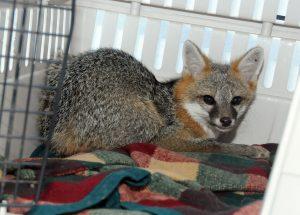What To Do If You Found a Sick or Injured Baby Fox
About Baby Foxes

Fox kits will often appear unsupervised for long periods while their parents are out hunting for food. They will play like puppies around the den site until the parents decide they’re old enough to go on hunting trips. Then they will suddenly disappear. Observe the kits from a distance; if they seem energetic and healthy, leave them alone. If they appear sickly or weak, or if you have reason to believe both parents are dead and they appear to be healthy, you should contact a licensed wildlife rehabilitator.
What to Do
All of these animals have the potential to bite, scratch, or cause serious injury to yourself and other people. All mammals are potential carriers of the rabies virus. Learn more about rabies-vector mammals. For further assistance on Transport, please refer to the "Who to Call for Help" section on this page. If the animal appears to be alert, please don’t attempt to rescue yourself, call the numbers listed above.
If the animal is quiet, not moving quickly, and you have no other choice, please follow these protocols and exercise extreme caution:
Protect yourself
Wear gloves. When dealing with carnivores, a thick pair of work gloves, a thick jacket, and other personal protection can prevent injury. Do not ever use bare hands when helping mammals. Please be careful not to get bitten, licked, or scratched by the animal as well.
Prepare a container
Have a sturdy box or animal carrier ready to contain the animal. Garbage cans, recycling bins, and plastic containers will work in a pinch, depending on the size of the animal. Make sure that you have a lid that will fit securely to the top of the box.
Capturing the animal
Using a thick towel or blanket, quickly place this over the entire animal, secure the body and head inside the towel or blanket and immediately place the animal in an appropriately-sized, secure box or carrier. Make sure the box has holes in the lid.
Transport
Transport the animal to one of the following places:
- A wildlife rehabilitator (find a rehabilitator near you)
- Tufts Wildlife Clinic during clinic hours M-F 8am-5pm and Sat, Sun, & Holidays 9am-5pm. If it is after clinic hours, a carnivore should be brought immediately to Tufts Emergency Clinic.
During transport, keep the animal in the box or crate, keep the car quiet (radio off).